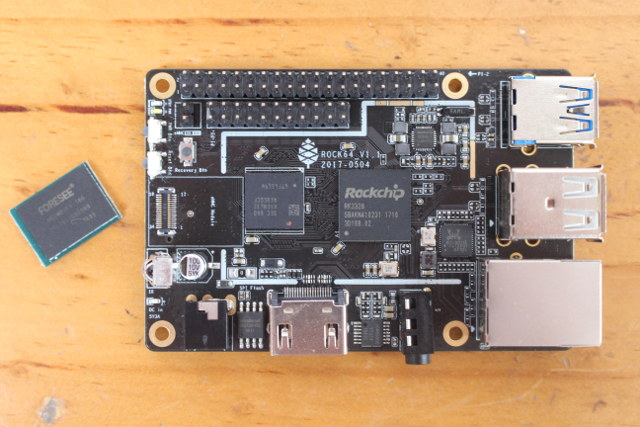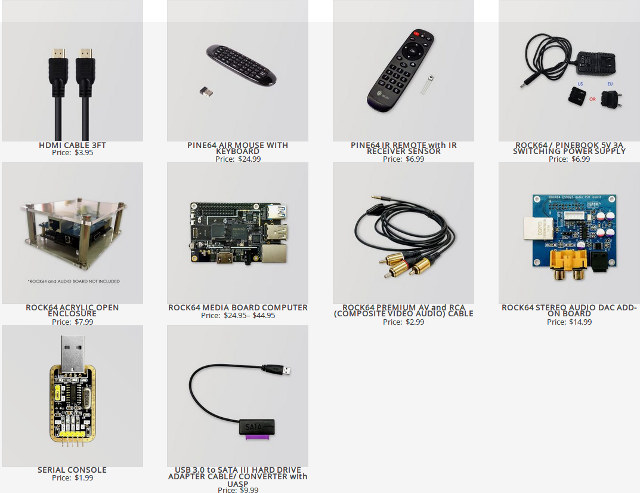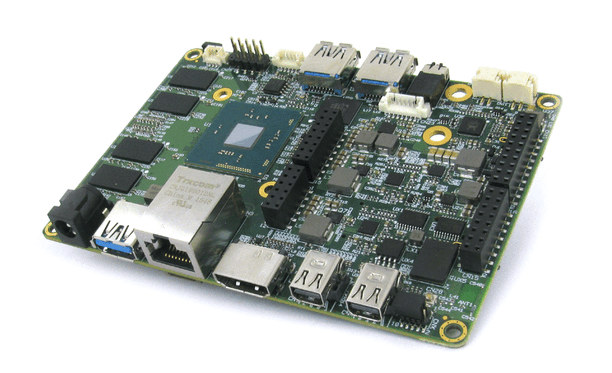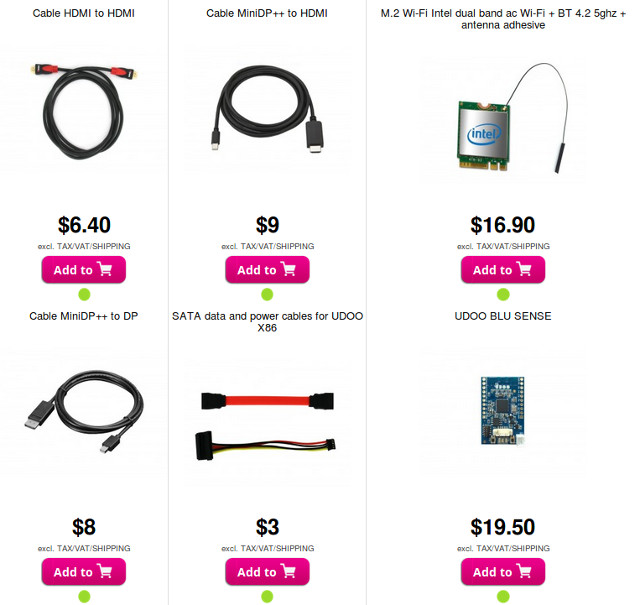Pine64 ROCK64 is a development board powered by Rockchip RK3328 quad core processor, while UDOO X86 board is based on Intel Atom x5-E8000 or Celeron N3160 processor plus a Quark SE MCU. What do they have common? Not much, except both boards are now officially available for sale.

Just a quick reminder of the specifications for ROCK64 board:
- SoC – Rockchip RK3328 quad core Cortex A53 processor with ARM Mali-450MP2 GPU
- System Memory – 1, 2, or 4 GB LPDDR3
- Storage – eMMC flash module socket + micro SD card slot + 128 Mbit SPI flash
- Video & Audio Output – HDMI 2.0a up to 4K @ 60 Hz with HDR10 and HLG support, 3.5mm AV port (composite video + stereo audio)
- Video Codec – 4K VP9, H.265 and H.264, 1080p VC-1, MPEG-1/2/4, VP6/8
- Connectivity – Gigabit Ethernet
- USB – 2x USB 2.0 ports, 1x USB 3.0 port
- Expansion Headers
- 40-pin Pi-2 Bus with GPIOs, 2x I2C, Analog inputs, UART, SPI, and power signals (5V, 3.3V, and GND)
- 22-pin Pi-P5+ Bus with GPIOs, I2S, S/PDIF, Ethernet, and power signals (5V, 3.3V, and GND)
- Misc – IR receiver; power, recovery & reset buttons; eMMC jumper
- Power Supply – 5V/3A via 3.5mm/1.35mm power barrel
- Dimensions – 85 x 56 mm

What we did not know at the announcement where the price, and as expected the board is competitively priced at $24.95 with 1GB RAM, $34.95 with 2GB RAM, and $44.95 with 4GB RAM. Those price do not include shipping, and the boards are scheduled to ship on July 31st. The company is also offering several accessories for the board with remote controls, various cables, a case, a power supply kit, and an audio DAC add-on board.
 UDOO X86 boards have been available since last year, but only through Kickstarter, and the company has now announced the boards were available for direct purchase. There are now four versions of the board, namely Basic, Advanced, Advanced Plus and Ultra with the following specifications:
UDOO X86 boards have been available since last year, but only through Kickstarter, and the company has now announced the boards were available for direct purchase. There are now four versions of the board, namely Basic, Advanced, Advanced Plus and Ultra with the following specifications:
- SoC
- Basic – Intel Atom x5-E8000 quad core processor @ 1.04 / 2.0 GHz GHz with 12EU Intel HD graphics @ 320 MHz (5W TDP)
- Advanced / Advanced Plus – Intel Celeron N3160 quad-core processor @ 1.6 GHz / 2.24 GHz (Turbo) with 12EU Intel HD graphics@ 320 MHz/640Mhz (4W SDP / 6W TDP)
- Ultra – Intel Pentium N3710 quad core processor @ 1.60 / 2.56 GHz with 16EU Intel HD 405 graphics @ 400 / 700 MHz (4W SDP / 6W TDP)
- System Memory
- Basic – 2 GB DDR3L
- Advanced – 4GB DDR3L dual channel
- Ultra – 8GB DDR3L dual channel
- Storage
- SATA connector, M.2 key B SSD slot, and micro SD card slot
- Advanced Plus & Ultra only – 32GB eMMC flash
- Video Output – 1x HDMI port with CEC support, 2x mini DisplayPort++ (Dual-mode DisplayPort)
- Audio I/O – HDMI, mini DP, microphone and headphone combo connector, speaker header, and S/PDIF output; ALC283CG audio codec
- Video Codec
- Decode – H.265/HEVC, H.264, MPEG-2, MVC, VC-1, WMV9, VP8
- Encode – H.264, MVC, JPEG
- Connectivity – Gigabit Ethernet, optional 802.11ac WiFi and Bluetooth 4.0 using M.2 slot
- USB – 3x USB 3.0 host ports
- Serial – 2x UART ports on interrupt pin headers
- Headers (for quad core processor) – Up to 28 external GPIOs, LPC, 2x I2C, GPIOs, touch screen I/F
- Arduino part:
- Intel Curie module with Intel Quark SE @ 32 MHz and 32-bit ARC core @ 32 MHz
- SPI flash
- Bluetooth LE
- 6-axis accelerometer and gyroscope
- UDOO Bricks connector
- Arduino UNO headers (3.3V I/Os with protection against 5V over-voltage):
- 14 digital I/Os including 4 PWM
- 6x 10-bit analog inputs
- Misc – IR receiver
- Power Supply – 12V/3A
- Dimensions – 12 x 8.5 cm
The board can run Linux, Android, and Windows 10 operating systems. The prices excluding taxes, and shipping are:
- $125 for UDOO X86 Basic
- $149 for UDOO X86 Advanced
- $165 for UDOO X86 Advanced Plus
- $267 for UDOO X86 Ultra
There are also various cables, sensor boards, WiFi module, and other accessories, which you can purchase on UDOO X86 product page.


Jean-Luc started CNX Software in 2010 as a part-time endeavor, before quitting his job as a software engineering manager, and starting to write daily news, and reviews full time later in 2011.
Support CNX Software! Donate via cryptocurrencies, become a Patron on Patreon, or purchase goods on Amazon or Aliexpress





And shipping price is still $30 for ROCK64, like for other pine products. Then it’s a no go for me.
@Gabe
Why $30? For me it’s $12…
@cnxsoft:
Please update the specs, it’s now ‘1600MHz LPDDR3 memory’ since according to Pine64 IRC otherwise especially the 4GB variant would be much more expensive.
Quark is Dead. Long Live Quark!
@Gabe
Here the shipping is also $30
At the time of writing, the hdmi cec of udoo x86 is not implemented. And we are not sure what it will be in the future.
I have two options for ROCK64 shipping to Thailand:
Standard Flat Rate: $11.99
Express Flat Rate: $30.00
It’s quite possible some countries don’t have the “standard flat rate” option.
Would love to see a Pinebook based on the RK3328 with 4GB of RAM!
@Mum
Not the best option for this, since it’s a TV box SoC without LCD interface -> http://www.cnx-software.com/2017/01/11/rockchip-rk3328-quad-core-64-bit-arm-soc-is-designed-for-4k-hdr-android-7-1-linux-tv-boxes/
It would still be possible to use an HDMI to LVDS chip, but that would add to the cost.
@cnxsoft
In fact all these slim laptop variants rely on eDP displays today (currently in A64 Pinebook there’s an LCD-to-eDP converter that can be saved once/if Pinebook gets an A63 upgrade) so for RK3328 a HDMI-to-eDP converter would be needed. Also charging circuitry is necessasry and more importantly software support for the latter.
While this not exists for TV box SoCs for obvious reasons you get this ‘for free’ from tablet SoC vendors (part of their BSP, in Pinebook currently all community did to make battery working was to accept that we’re dealing with a ‘black box’ now — the OpenRISC core living inside A64 and controlling charging and sending events to the outside if battery runs low — and have to adjust some parameters. With mainlining efforts progressing nicely but slowly this might change sometimes in the future)
Exactly. I would love for some of these SBCs to have an eDP connector because then it would be possible to drive one of these high resolution LCD displays. You can easily buy a 4K eDP panel for under $100 USD. For eDP you only need a backlight driver and DisplayPort, no other circuitry required. But then you will have to spend way more on something to drive it, because none of the SBCs ever pays attention to DisplayPort/embedded DisplayPort!
HDMI is great, but useless when you want to run a high resolution LCD without expensive adapters. Even 1366×768 LCDs now are moving toward eDP. LVDS is a dead end.
What are the expectations of a good Open Source support for the ROCK64. The 4GB RAM one looks appealing and nicely priced.
What about its USB3 port, is it likely for it to achieve full USB3 speed?
Can’t believe I write this today the 3rd time on CNX: please check the bottom of ‘Some storage benchmarks on SBCs’ thread in Armbian forum (same regarding open source support, there’s an own ROCK64 thread that pretty much summarizes what’s going on without crawling through #ROCK64 IRC backlog)
My apologies, I had not seen that comment.
Thanks.
I will answer here for you 🙂
tkaiser testing showed: “That’s sequential write performance of +325 MB/s and read even better at ~345 MB/s.”
So yes, USB3 speeds are very good. Gigabit testing also shows it can reach full speed. So this is the board to buy if you want USB3 + Gigabit at full performance.
Did anyone else notice that the DAC board for ROCK64 has a 100Mbs ethernet port?
@crashoverride
Sure and both interfaces should work at the same time (not tested yet, I’ve the DAC board here but still struggle with minor Gigabit Ethernet issues, the usual USB3 PHY and host controller issues you don’t want to accept ;), some discussions and don’t want to waste too much yet with these issues). It should be just a matter of DT modifications to enable both GbE and Fast Ethernet at the same time but I think no community members tried yet.
BTW: I would really like seeing you getting a ROCK64 dev sample (including DAC board and the JMS578 USB-to-SATA cable) for obvious reasons. No idea how to negotiate this though (either drop me a note in Armbian forum or join pine64 IRC and PM TL Lim referencing this comment — maybe better).
@crashoverride
@crashoverride, please PM me at PINE64 IRC or forum on your shipping info (include phone number), I ship out the ROCK64, DAC, and SATA cable0 to you.
@tkaiser
Well, I did write a very long, eloquent and engaging comment worthy of a Nobel prize, but the forum ate it when I hit “Submit”, so what follows is the TL;DR version.
1) I’m not a DAC enthusiast, but I am puzzled what one uses a DAC+Ethernet board for. It seems like an odd combination to me.
2) I noticed the USB3-SATA adapter is JMicron based. Coincidence? 🙂
3) I may purchase one to play with, but I do not want to be “obligated” with a dev sample. I am sure supply will be limited at launch and the dev samples are better going to those with stated intents of support.
4) I have no experience with the company behind ROCK64. How is their community engagement level?
@crashoverride
Lost comments here happen all the time to me, in the meantime I learned to [cmd]-[c] at least three times before hitting the ‘submit button’ 🙂
1) I’m not into DAC/audio either (at least with Linux) and I think this add-on is more or less a demonstration of capabilities primarily made for audiophiles and just exposing the additional Ethernet port since it’s there anyway. Since Pine folks also currently explore cluster stuff (with A64 though) I hope for another RK3328 board later with 100 Mbits/sec WAN port and an integrated switch IC to provide a few LAN ports.
2) JMicron is one of the few choices available. ASMedia is maybe the most succesful chip maker for USB-to-SATA bridges but they’ve a bad history of reusing USB product IDs making it hard to differentiate their chips (bugs) and more importantly their bridge chips used with branded firmwares show problems (the Seagate story).
3) If even I get dev samples being such a PITA for every vendor… be ensured that there are really no obligations involved (that is something I constantly have to tell other members of the open source community: your time is valuable. Asking for dev samples doesn’t mean you have to give something back since good vendors are able to learn even from you refraining to support their platform after testing if you explain your reasons — that’s the only moral obligation and this one is mandatory).
4) We’re talking about Pine64 here. Major problem in the beginning (18 months ago): Pain64 due to crazy marketing and a hardware design that made Pine64 a ‘support nightmare’. They had also a massive and frustrating support problem in their forum (censorship by community members playing moderator from hell). But… they really improved, listened constantly, solved problems, picked up good ideas…
I still have no idea what their business model is and how they motivate themselves. But in the meantime they do a great job really trying to improve things from an overall community point of view (eg. following the suggestion to add at least 2 MB SPI NOR flash everywhere so at least in 2019 we have a situation where all these ARM thingies are shipped with an universal boot loader with device specific settings that is able to boot whatever device agnostic OS you prefer)
5) Join the party
yeah i do use dac extension boards on my various “arm audio projects” and that one is quite a funky one indeed.
i’m sure lots of audiophile enthusiasts will be thrilled by the ethernet bus riding along the “Dedicated 192kHz/24bit high-quality legendary ESS ES9023 Sabre DAC for HiFi sound quality”
On the other hand that is quite nice (if not mandatory) : “Selectable MCLK source – from source or on board crystal generated”
Unfortunately it’s impossible to tell which crystal they used and looking at the fairly low price of that board i will assume it’s the same as all the other chinese dac board clones.
Anyways i’m more interested in @tkaiser comments about considering waiting for the second batch of rock64 “rev 1.1” boards, or does it already look solid from the point of view of your sample ?
thx
@tkaiser
He’s probably in a country where it’s costing a bit for shipping. $7.99 for shipping on one with an eMMC card.
All things being equal…I’ll be getting one of these shortly. Price is right for experimentation- and if I can make OE build images for this easily enough, it’s enough of a beast to think about for $44 plus S&H.
It is likely to be able to boot from the USB3 port?
@mdel
ESS ES9023 high-quality :LOL legendary :LOLs
modern 50cent DAC chips do not need selectable MCLK & don’t mention about any bus riding
Good sound = just working with a chip description/datasheet + good pcb design 🙂
no more need ruby,blackgate,gold foil caps & other marketing dust
AlexN: in the future yes, we are figuring out now how to load u-boot from flash, this makes it possible to later support USB boot,
@ayufan
Thanks for the answer.
I look forward to it.